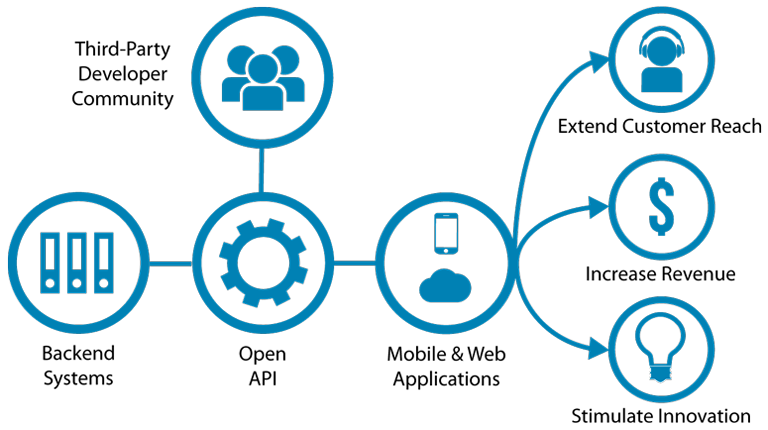

APIs Economy Practice
What is API economy?
 API economy is the exposure of an organization's digital services and assets through application programming interfaces (APIs) in a controlled way. In this context, the word "economy" refers to the careful management of available resources and the term API economy can be used as a synonym for API management.
API economy is the exposure of an organization's digital services and assets through application programming interfaces (APIs) in a controlled way. In this context, the word "economy" refers to the careful management of available resources and the term API economy can be used as a synonym for API management.
APIs ensure that the data extracted from one software application is formatted and passed to the next application without change, even if the associated app's feature sets have been updated. While API tools have always played an important role in software development, today's demand for data integration has been encouraging vendors of all sizes to "go modular" and break complex software components down into smaller, containerized components called microservices.
By exposing the interfaces that allow microservices to communicate with each other, vendors are able to meet the needs of specific groups of customers without having to rearchitect software; it also gives customers more control over vendor applications.
Experts predict that as software developers see the economic advantages of integration, many large, monolithic software systems currently supported on premises will decompose into highly-organized sets of microservices available in the cloud.
The ultimate goal of API economy is to facilitate the creation of user-focused apps that support line of business (LOB) goals and improve workforce throughput. As managers look for creative ways to monetize services and assets through APIs, it is expected that vendors will need to make API management simpler to accommodate the needs of the citizen (non-technical) developer in low-code software development environments.
The OpenAPI Specification
An API (application programming interface), allows one piece of software to talk to another. Let’s take the example of Uber. Uber connects you with a driver when you need to go from location to another. The driver is given your coordinates on Google Maps, allowing them to easily navigate to the required locations. But how does Uber communicate with Google Maps to facilitate this? How does the data transfer happen between Google Maps and Uber? The answer is an API. Uber communicates with Google Maps through the Maps API.
APIs have been around for a while, but only recently have people begun to realize their myriad use cases to help them achieve their business goals. As APIs become ubiquitous, the need for standardization of their design and consumption became eminent. The OpenAPI Specification (OAS) has emerged as the key to doing this. Essentially, the OAS is a set of rules that defines the API’s contract, detailing its resources, and the corresponding reponse-request cycles. Think of the OAS as your API’s interface for implementation and consumption.
The OpenAPI can bring some great benefits when implementing and consuming APIs, like -
- Better Quality Apps, Faster: The beauty of the OAS is that with it, everyone working on your API will understand what it is supposed to do and how that relates to their job. This results in fewer dependencies between teams and therefore a faster go to market.
- Better Developer Experience: This is the sum of all of the experiences developers have while using your software. In today’s competitive environment, having a positive (or negative) developer experience could make or break your new venture.
Why are They Important?
So what’s the big deal? Why should we care about APIs? The rise of APIs and the OpenAPI Specification bring some great benefits to organoizations.
- Driving Platforms: APIs, by connecting different software applications together, they also allow 3rd party developers to build on top of your existing products and services. This creates an extensible platform ecosystem that enhances your offering for your customers at minimal cost.
- Driving Business: Just like how Google Maps’ data is useful for Uber, your organization’s data can be useful for others to build or enhance their own offering. Using APIs, your company can expose important data that can benefit others. Various business models around APIs based on the importance of the data exposed have since evolved, thus helping them companies growth and revenue to their business through their APIs.
- Driving Technology: The speed of creating and updating features can be make or break for your product strategy. Having a well-oiled internal technology stack and effective communication between teams and software components can help you achieve development speed and efficiency. APIs can contribute in having different internal component communicate better, and have become the foundation for new and improved architectures like Microservices and Serverless
Select the language of your preference